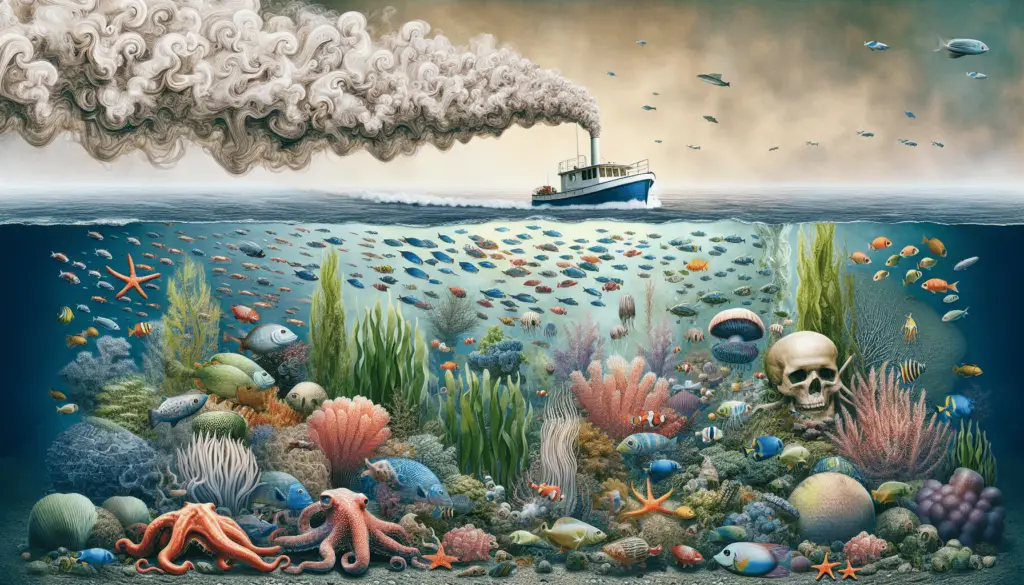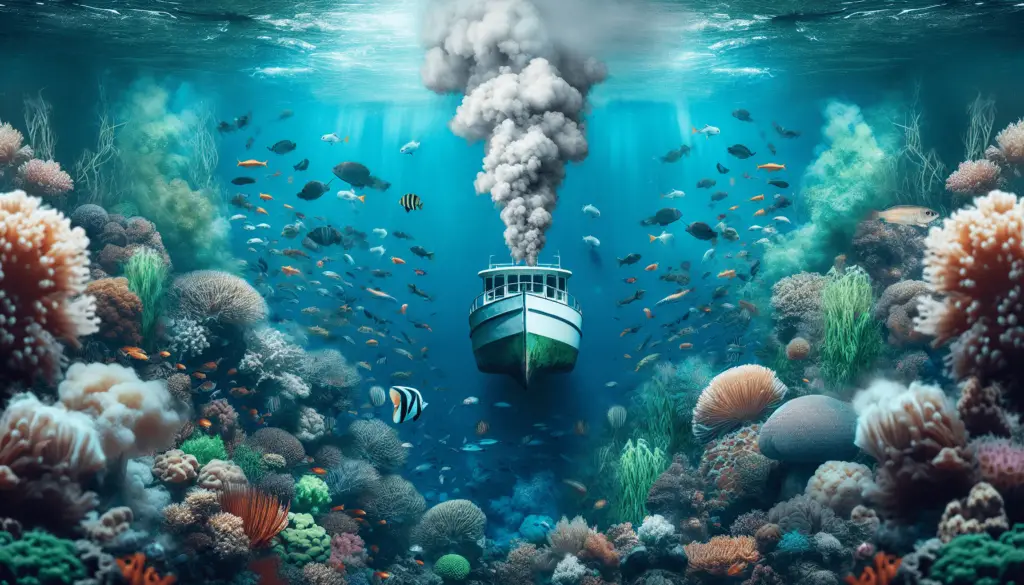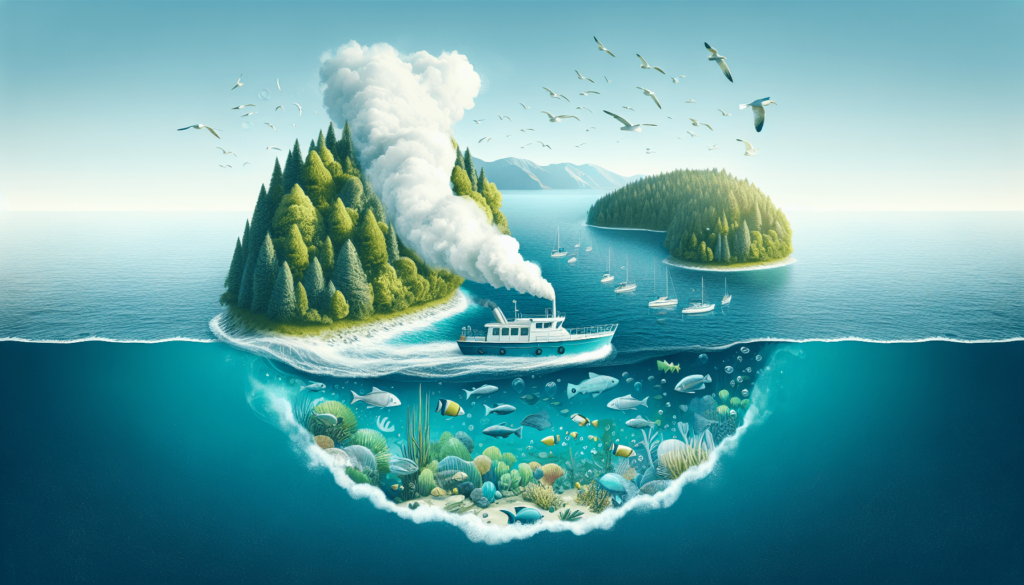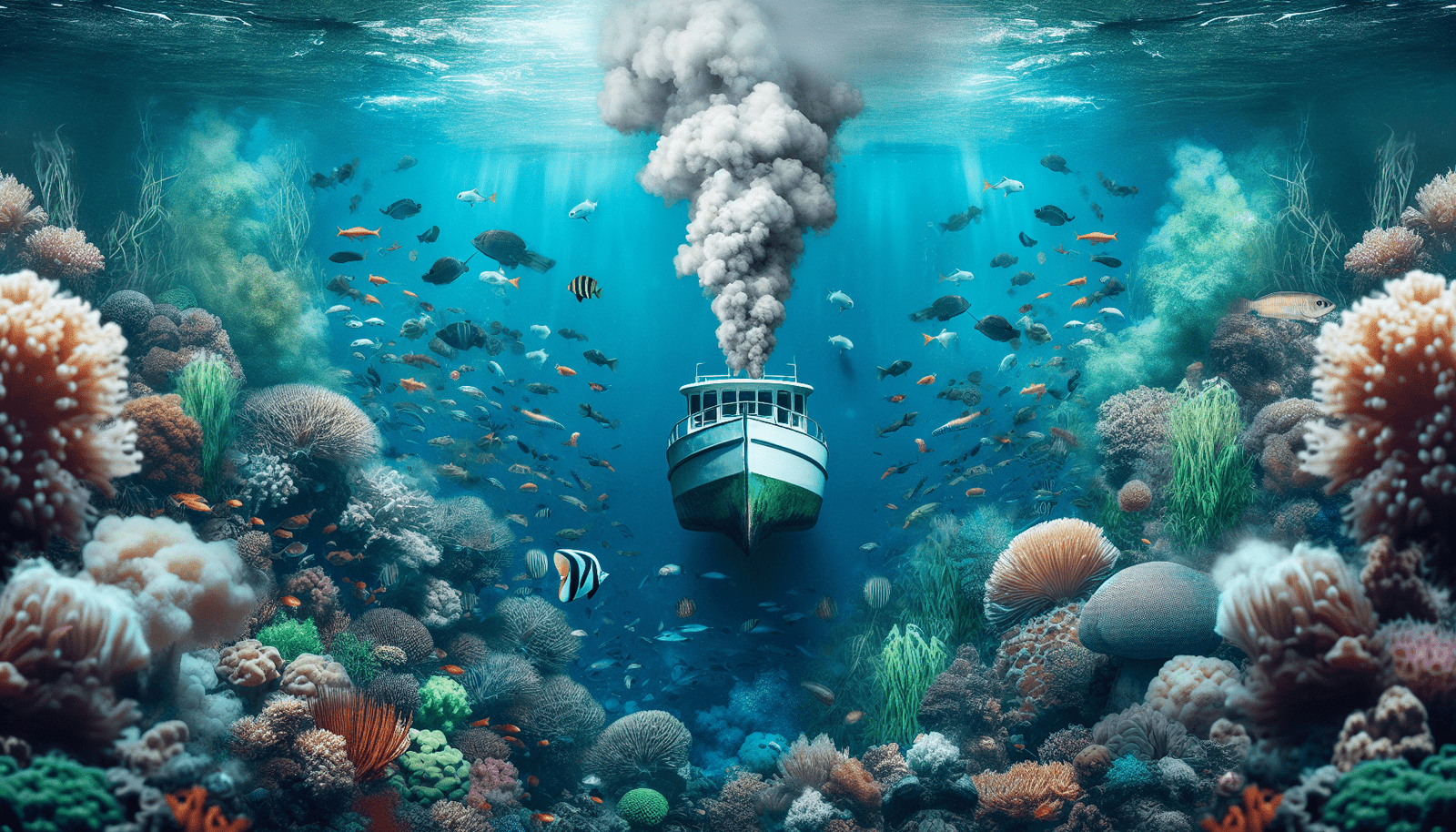Complex and multi-faceted, the ecological impact of boat engine exhaust is a persistent issue that deserves your attention. Sure, a day out on the water can be incredibly refreshing, but it’s crucial to be aware of the effect each boat trip has on the environment. Imagine the millions of boats worldwide, leisurely cruising on various bodies of water, each emitting exhaust that carries a range of pollutants. This article deciphers the extensive repercussions of boat engine exhaust on our precious ecosystems, making you well-informed on the pressing issue.

Understanding Boat Engine Exhausts
Boats, like any other motorized vehicle, have engines that burn fuel to create power. This process invariably leads to the production of emissions, collectively referred to as boat engine exhaust. This exhaust is expelled from the boat through a specially designed system, aiding in the propulsion of the boat forward.
Definition of a boat engine exhaust
When you think about exhausts, you’re probably most familiar with the systems found on cars. Just like those vehicles, boats also have an engine exhaust system that is essentially an intricate ventilation system. Its primary function is to evacuate burnt gases and particles that result from the combustion process safely away from the engine. Without this system, not only would your boat be less efficient, but the accumulated emissions could pose a significant hazard.
Components of boat engine exhaust
A boat engine exhaust system primarily is composed of an exhaust manifold, exhaust pipes, and a muffler. The exhaust manifold collects the exhaust gases from multiple cylinders into one pipe. The gases then flow through the exhaust pipe, which directs the gases safely out of the system. The muffler is a specially designed component that reduces the noise produced by the exhaust gases’ rapid outflow.
Different types of exhaust engines in boats
Two major types of boat engine exhaust systems are common: wet and dry exhaust systems. Wet exhaust systems utilize water from the surrounding environment to cool exhaust gases and quiet the system, making them ideal for smaller boats. On the other hand, dry exhaust systems are typically found on larger, industrial boats and are much noisier and hotter than their wet counterparts.
Boat Engine Exhaust Composition
Exhaust from boat engines, like exhaust from any combustion process, contains a number of different substances. It’s a complex combination of gases and particles, each with differing effects on the environment.
Main constituents of boat engine exhaust
The main constituents of boat engine exhaust are water vapor, carbon dioxide (CO2), nitrogen (N2), and oxygen (O2). These gases make up the majority of the emissions and are generally considered harmless in moderate quantities. However, burning fossil fuels also produces other gases and particulates that are more concerning.
Potential toxins in boat engine exhaust
Boat engine exhaust can contain potentially toxic substances, including carbon monoxide (CO), sulfur oxides (SOx), nitrogen oxides (NOx), and fine particulate matter (PM). These compounds are known for their negative impacts on both human health and the environment.
How engine type and fuel affect exhaust composition
The type of engine and the fuel you use in your boat significantly affect the nature of the exhaust emissions. Diesel engines, for instance, tend to produce more nitrogen oxides and particulates but less carbon monoxide and hydrocarbons than gasoline engines. Similarly, lower-quality fuels can result in more sulfur oxides and other harmful emissions when burned.

Emission of Greenhouse Gases from Boat Engines
One of the major environmental impacts of boat engine exhaust is the emission of greenhouse gases. These are gases that trap heat in the atmosphere and contribute to global warming.
Quantity of CO2 emissions from boat engines
Boats, especially larger vessels, can emit significant amounts of carbon dioxide. Some studies estimate that the global shipping industry alone contributes about 3% of total global CO2 emissions – an impact comparable to some developed nations.
Effect of boat engine exhaust on global warming
Greenhouse gases like CO2 trap heat in the atmosphere, leading to an increase in the average temperature of the Earth’s surface. This is known as global warming, and it’s the main driver behind climate change. Climate change, in turn, leads to a myriad of issues including sea-level rise, changes in weather patterns, heatwaves, and biodiversity loss.
Comparison of greenhouse gas emissions from boat engines with other transportation modes
When compared to other forms of transportation, boats are often more efficient on a ton-mile basis (the freight transport of one ton of goods for one mile). However, because boats often travel very long distances, their total emissions can be quite high. Furthermore, older, less efficient engines and poorer quality fuels can mean that some boats are far more polluting than others.
Impact on Air Quality
The emissions from boat engines contribute significantly to overall air pollution levels, particularly in busy harbors and marinas. This degradation in air quality can have an immediate impact on human health, in addition to long-term environmental implications.
Boat exhaust’s effect on air pollution level
Boats can emit large amounts of pollutants such as sulfur dioxide, nitrogen oxides, and particulate matter. High concentrations of these pollutants in the air can cause smog and lead to poor air quality, particularly in areas with heavy marine traffic.
Health risks associated with poor air quality
Poor air quality can have serious effects on human health. Short-term exposure to pollutants can cause respiratory discomfort and exacerbate existing conditions like asthma. Long-term exposure can increase the risk of chronic respiratory diseases, heart disease, and even lung cancer.
Regulations on exhaust emissions to improve air quality
To help improve air quality, stringent regulations have been put in place to limit the types and amounts of pollutants that can be emitted from marine engines. These regulations often focus on the most harmful pollutants, including sulfur dioxide, nitrogen oxides, and particulate matter.

Effect on Water Bodies
Boat engine exhaust doesn’t only affect air quality; it can also have significant impacts on water bodies, particularly in areas with heavy boat traffic.
Possible water contamination from boat exhaust
Some of the gases and particles produced by boat engines, particularly in older or poorly maintained vessels, can become water pollutants. When these substances enter the water, they can have a range of negative effects on water quality and marine life.
Effect of exhaust emissions on the marine ecosystem
Exhaust emissions can have profound effects on marine ecosystems. These effects can range from acidification of the water, which can harm shellfish and other marine creatures, to the depletion of oxygen levels in the water, leading to “dead zones” where no marine life can survive.
Impact of pollutant dispersion on water quality
The spread of pollutants from boat exhaust depends on many factors, including the size of the body of water, water currents, wind conditions, and the amount and type of emissions. However, in general, higher concentrations of pollutants are found in busy harbors and marinas.
Impact on Biodiversity
The effects of boat engine exhaust can have far-reaching implications on biodiversity, affecting everything from marine life to birds and plant life.
Effects of boat exhaust gases on marine life
Boat exhaust gases can lead to the acidification of marine environments, impacting a broad array of marine wildlife ranging from microscopic plankton to larger mammals like seals and dolphins. Many marine organisms, particularly those that build their shells or skeletons from calcium carbonate, are sensitive to changes in acidity levels.
Impact on local and migratory bird populations
Birds, especially those that rely on marine ecosystems for their survival, can also be affected. For instance, pollutants from boat exhaust can affect fish populations, reducing the food availability for certain bird species. Moreover, some pollutants can accumulate in birds’ bodies, leading to illness and fertility issues.
Possible effect on plant life alongside water bodies
Plant life in and around water bodies may also be affected by boat engine exhaust. For instance, excess nitrogen deposition in the water can lead to harmful algal blooms, which may outcompete native plants and disrupt local ecosystems. This, in turn, could impact the entire food chain.

Health Implications for Humans
While the environmental impacts are significant, so too are the potential health implications for humans exposed to boat engine exhaust.
Potential respiratory issues stemming from boat engine exhaust
Boat engine exhaust contains several pollutants that can exacerbate respiratory conditions like asthma and chronic obstructive pulmonary disease (COPD). Prolonged exposure to these pollutants may also increase your risk of developing these conditions if you do not already have them.
Carcinogenic risks associated with boat exhaust gaseous emissions
Several compounds found in boat exhaust, including particulate matter and certain organic compounds, are known or suspected carcinogens. Long term exposure to such pollutants could increase the risk of developing lung cancer and other types of cancer.
Community health impact in areas with high boat traffic
Areas with high levels of boat traffic, such as busy harbors and waterfront communities, can experience environmental justice issues. The effects of air and water pollution are often borne disproportionaly by the people living in these areas, leading to higher rates of respiratory diseases and other health problems.
Noise Pollution from Boat Engines
In addition to air and water pollution, boat engine exhausts are also a significant source of noise pollution. This is especially true for boats with older, less efficient exhaust systems.
Role of engine exhaust in generating noise
The process of expelling exhaust gases creates noise as the gases leave the boat’s engine. The design and efficiency of the exhaust system play a major role in mitigating this noise. Older, less efficient systems are often significantly noisier than newer, more modern systems.
Impact of noise pollution on humans and wildlife
Noise pollution can have serious health impacts on humans, leading to increased stress and sleep disturbances. For wildlife, especially marine wildlife, noise pollution can disrupt mating calls and hunting behavior, leading to decreased population levels.
Regulations to control noise pollution from boat engines
Steps are being taken to manage and mitigate noise pollution from boat engines. Regulations have been put in place that govern how and when boats can be used in certain areas, aimed at minimizing the disturbance for both humans and wildlife.

Policy Framework & Regulation
Addressing the ecological impact of boat engine exhaust requires comprehensive policies and regulations that govern the design and use of boat engines.
Current regulations on boat engine exhaust
Current regulations largely focus on limiting the emissions of specific pollutants, such as sulfur oxides, nitrogen oxides, and particulate matter. These regulations, which vary by country and region, often require boats to use cleaner fuels and more efficient engines.
International policies regarding boat emissions
Internationally, the International Maritime Organization (IMO) has set strict regulations on boat emissions. The rules apply to both commercial and recreational boats and aim to reduce the impact of boat engine exhaust on human health and the environment.
Effectiveness of existing rules and regulations
While current rules and regulations have been successful in reducing certain types of emissions, much work remains to be done. For example, greenhouse gas emissions from boats continue to rise, despite efforts to limit them.
Solutions for Reducing the Ecological Impact
In order to fully address the impact of boat engine exhaust on the environment, a combination of technical and behavioral solutions will be necessary.
Eco-friendly alternative engines for boats
Technological advancements are leading to greener alternatives to traditional boat engines. Electric engines, hybrid technologies, fuel cell powered engines, and even wind and solar powered boats are making strides in the market. These technologies emit significantly fewer pollutants and produce less noise and greenhouse gases.
Strategies for reducing exhaust emissions
Implementing strategies to reduce the emissions from existing engines can be another viable way to minimize the impact of boat engine exhaust. For instance, regular engine maintenance, using high-quality fuels, and adopting “slow steaming” (traveling at slower speeds) can all significantly reduce a boat’s emissions.
Role of sustainable boating practices in preserving ecology
Lastly, we must not overlook the importance of adopting sustainable boating practices. This includes respecting regulations, protecting marine life, minimizing noise, keeping the water clean, and reducing fuel consumption. As boaters, we have a responsibility to protect the very environments that we enjoy.
In conclusion, the ecological impact of boat engine exhaust is wide-ranging, affecting air and water quality, biodiversity, human health, and even contributing to climate change. However, understanding these impacts is the first step towards finding the solutions. Through technological advancements, targeted regulations, and sustainable practices, we can significantly reduce this impact and create a more sustainable future for marine transportation.

